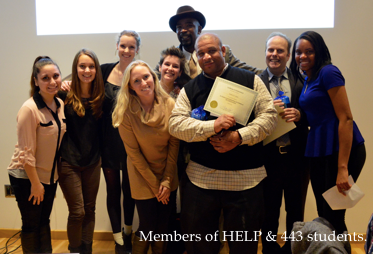When I went to HELP, I realized that they were welcoming us into what was like their home. They immediately respected us and allowed us to teach them about a topic of which they certainly had more than a passing knowledge of. Everyone in the room was older than me and they certainly knew more about HIV than I did, as they have the lived experience, but nonetheless they respected me and immediately gave me their attention when it came time to share the module with them. What was even more interesting was that we did not have to do anything to earn their trust, they willingly gave it and in doing so they created the environment that allowed the module to flourish, not us students.
The people we were engaging with were not average community members. They were leaders in their communities. They were educators, speakers, and advocates. I soon realized that the module had a completely different meaning to them because HIV was part of their lives every single day. What was most impressive for me was watching how each person took th e module and made it unique to their own experiences living with HIV. One man in particular, Turner, taught the module back to us in a way that was so powerful it brought one of the other individuals in our group to tears. He talked about the stigma he faced and how even his own family had ostracized him for years because they did not understand what was happening to him. As I listened to him teach I realized that what we had done by teaching them the module was not give them some magic tool to conquer every challenge they would face, but rather give them a resource to further their work against the stigma that comes with living with HIV.
e module and made it unique to their own experiences living with HIV. One man in particular, Turner, taught the module back to us in a way that was so powerful it brought one of the other individuals in our group to tears. He talked about the stigma he faced and how even his own family had ostracized him for years because they did not understand what was happening to him. As I listened to him teach I realized that what we had done by teaching them the module was not give them some magic tool to conquer every challenge they would face, but rather give them a resource to further their work against the stigma that comes with living with HIV.
When I taught the module at HELP, I stuck to teaching it back verbatim the way I had learned it because I did not want to sound like I did not know what I was talking about in front of a group that possessed more knowledge than I did. By the time I left HELP, I realized that the individuals in that room would teach the module back in a way that was so powerful and impactful that they would be better educators about HIV than I ever could. Of course I could learn all the science and the fancy biology that goes in to such a complicated virus, but what I would not be able to do is share stories about my personal experience with HIV because I have none. By listening to their stories and hearing their future goals, a level of trust was reached that allowed the module to be an effective resource to empower the community we were working with.
Later in his work, Freire states “But one does not liberate people by alienating them. Authentic liberation – the process of humanization – is not another deposit to be made in men. Liberation is a praxis: the action and reflection of men and women upon their world in order to transform it” (p. 79). In order to achieve liberation in the community you have to engage with them. It’s not about taking an action on their behalf with an assumption that you have some grand task to accomplish in their name. The key is utilizing their strengths and talents and developing them in a way that they can continue any work you started long after you have exited the community. This is empowerment. I think the biggest lesson I have learned through my experience at HELP and through dialogue in the classroom is that true “activism,” loosely using the word, means creating future leaders and advocates. Working in a community is not about you. It is true that you can bring skills and resources that are lacking in the community, but if you do not exit that community without leaving those skills and resources behind for the community members, any work you have done will not be long lasting. Empowering someone means engaging with them and not for them.

